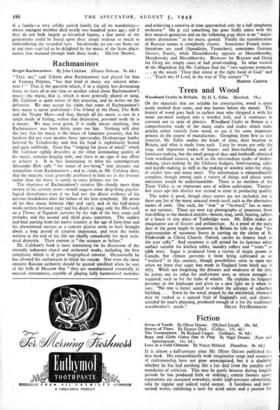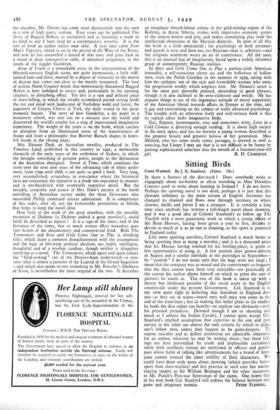Fiction
The Tormentors. By Richard Cargoe. (Gollancz. 9s. 6d.)
Boys and Girls Come Out to Play. By Nigel Dennis. (Eyre and Spottiswoodc. 11 s. 6d.)
Love in a Cold Climate. By Nancy Mitford. (Hamilton. 8s. 6d.)
IT is almost a half-century since Mr. Oliver Onions published his first book. His extraordinarily wide imaginative range and resources of craftsmanship have not gone unrecognised, but it is doubtful whether he has had anything like a fair deal from the pundits and mandarins of criticism. This may be partly because during longish periods he has produced little or nothing ; coterie favours apart, reputations are sustained nowadays, under high-pressure advertising. only by regular and indeed rapid output. A fastidious and taut- nerved writer, exhibiting a taste for acrid satire and a passion for the macabre, Mr. Onions has come most distinctively into his own in a vein of high poetic realism. Four years ago he published The Story of Ragged Robyn, as enchanted and as haunting a work in its kind as any I have read by a contemporary novelist. It is the sort of book an author writes once only. A year later came Poor Man's Tapestry, which is set in the period of the Wars of the Roses, and now he has unravelled a thread of that story and gone back in a mood of deep retrospective calm, of autumnal poignancy, to the youth of the juggler Gandelyn.
Arras of Youth is a remarkable essay in the interpretation of the fifteenth-century English scene, not quite harmonious, a little stiff- jointed here and there, marred by a degree of virtuosity in the matter of diction that comes too close to the merely mannered. The love of archaic North Country words that momentarily threatened Ragged Robyn is here indulged to excess and, particularly in the opening chapters, to disturbing effect. Yet this is a rare and delicate piece of story-telling, in which the vividly assimilated period setting holds the eye and mind with landscapes of Yorkshire wold and forest, the pageantry of Corpus Christi at York, the daily round in the great monastic houses. The story of how Gandelyn, a lay pupil in a monastery school, was sent out on a mission into the world and discovered the world's cruelty has a ring of impassioned imaginative experience. The weight of the years is on the book, which catches an afterglow from an illuminated sense of the transitoriness of things and from a philosophy that Brother Baruch shapes in heart- felt words in the closing pages.
Mrs. Eleanor Dark, an Australian novelist, produced in The Timeless Land, published in this country in 194!, a memorable chronicle of the early years of the settlement of Sydney, in which she brought something of genuine poetic insight to the delineation of the Australian aboriginal. Storm of Time, which continues the story over the next nine years of the advancing tide of white settle- ment, from 1799 until t8o8, is not quite so good a book. Very long, very accomplished, scrupulous in conscience where the historical facts are concerned, the narrative is a shade too expository in manner and is overburdened with essentially repetitive detail. But the breadth, sympathy and justice of Mrs. Dark's picture of the harsh unfolding of Australian society under the three Governors who succeeded Phillip command sincere admiration. It is competence of this order, after all, not the fashionably pretentious or febrile, that helps to keep the novel alive.
How little of the work of the great novelists, with the possible exception of Dickens (is Dickens indeed a great novelist?), could fairly be described as topical ! It is a sign of the times, and of the literature of the times, that so much serious effort nowadays goes into fiction of the documentary and controversial kind. Both The Tormentors and Boys and Girls Come Out to Play (a shocking title), which share a common disenchantment with the assumptions and the logic of left-wing political idealism, arc, highly intelligent, thoughtful and of a resolute candour, though neither is altogether satisfying as a novel. The Tormentors, which again and again echoes the " God-seeking " stir of the Dostoevskian underworld—it con- tains what is almost a pastiche of the Legend of the Grand Inquisitor —and which also seems to owe something to Mr. Koestler's Darkness at Noon, is nevertheless the more original of the two. It describes an imaginary forced-labour colony in the gold-mining region of the Kolyma, in Arctic Siberia, evokes with impressive economy scenes of the utmost horror and pity, and makes stimulating play with the intellectual obsessions of the Marxian dialectic. In spite of all this the book is a little amateurish ; the psychology of both prisoners and guards is now and then too, too Russian—that is, arbitrary—and the religious sentiment wears an air of contrivance. All the same this is an unusual feat of imagination, based upon a widely informed grasp of contemporary Russian realities.
In Boys and Girls Come Out to Play a parlour-pink American journalist, a self-conscious clever ass and the hollowest of hollow men, visits the Polish Corridor in the summer of 1939, taking with him the epileptic son of the rich and formidable woman who owns the progressive weekly which employs him. Mr. Dennis's satire is for the most part shrewdly pointed, abounding in good phrases, though it is also inclined to be over-elaborate and wordy. He has piquant things to say of the ingenuous attitude of moral superiority of the American liberal towards affairs in Europe at the time, and is gay and entertaining on the subject of really advanced psychology. The trouble with an otherwise lively and well-written book is that its topical satire lacks imaginative body.
Gay, flippant, inconsequent, sexy and sometimes witty, Love in a Cold Climate is diverting enough reading. It is about high society in the early 1930s, and has for heroine a young woman described as the greatest beauty and greatest heiress of her generation. Miss Mitford, who has some really comic passages, is shrewd as well as amusing, but I hope I may say that it is not difficult to be funny by putting sophisticated salacities into the mouth of a fourteen-year-old



































 Previous page
Previous page